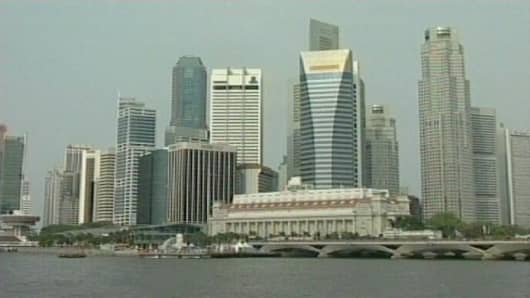Singapore's central bank said on Tuesday inflation would cool to an average 4 percent in the second half of 2008, after it hit a 26-year high above 6 percent in the first six months of the year.
In its twice-yearly Macroeconomic Review, the Monetary Authority of Singapore said its economic growth target of 4-6 percent this year was intact and was based on a gentle downturn in the United States' economy.
But it warned trade-dependent Singapore could be considerably hit by a more widespread slowdown.
"Inflation will stay high in 2008 due to a confluence of external and domestic factors, although it should moderate somewhat in the second half," it said in its report, available on its Web site www.mas.gov.sg.
"However, there are upside risks to global oil and food prices. Even if these prices were to level off, upward pressure on wages and rentals, reflecting domestic capacity constraints, are likely to remain."
Reacting to the inflation threat, Singapore's central bank earlier this month tightened monetary policy by allowing a rise in the Singapore dollar, its main policy tool.
The market is looking for clues on whether policy could be tightened yet again at the next review in October. The Singapore dollar has risen 5.4 percent against the U.S. dollar since the start of the year.
"The April monetary policy decision provides affirmation that the exchange rate path is consistent with the prevailing macroeconomic conditions in the economy," the MAS said in its review on Tuesday.
It also said that gross domestic product growth would likely weaken over the next two to three quarters.
"This baseline forecast is predicated on a mild U.S. downturn for 2008. However, if there is a more widespread decline in global and regional economic activity, Singapore's GDP growth will be more significantly affected."
First-quarter GDP growth came in unexpectedly strong, running at an annualised seasonally adjusted rate of 16.9 percent, and economists said the data had calmed fears that the weakness of the U.S. economy would drag on Singapore, giving the central bank room to tighten policy.
Manufacturing accounts for about a quarter of economic output and the city-state would be hit by any global economic downturn because of its heavy reliance on exports to Europe and the United States.
The MAS also pointed out that the cost of doing business in Singapore, a base for international companies and their families in Asia, had risen.
It said the unit business cost index for the manufacturing sector -- which measures changes in the cost of producing one unit of manufacturing output after accounting for productivity changes -- rose 4.5 percent in the fourth quarter from a year ago, the seventh straight quarter of growth and the most rapid rate of increase since the fourth quarter of 2001.
This mainly reflected a sharp rise in unit labour costs as well as government rates and fees.


